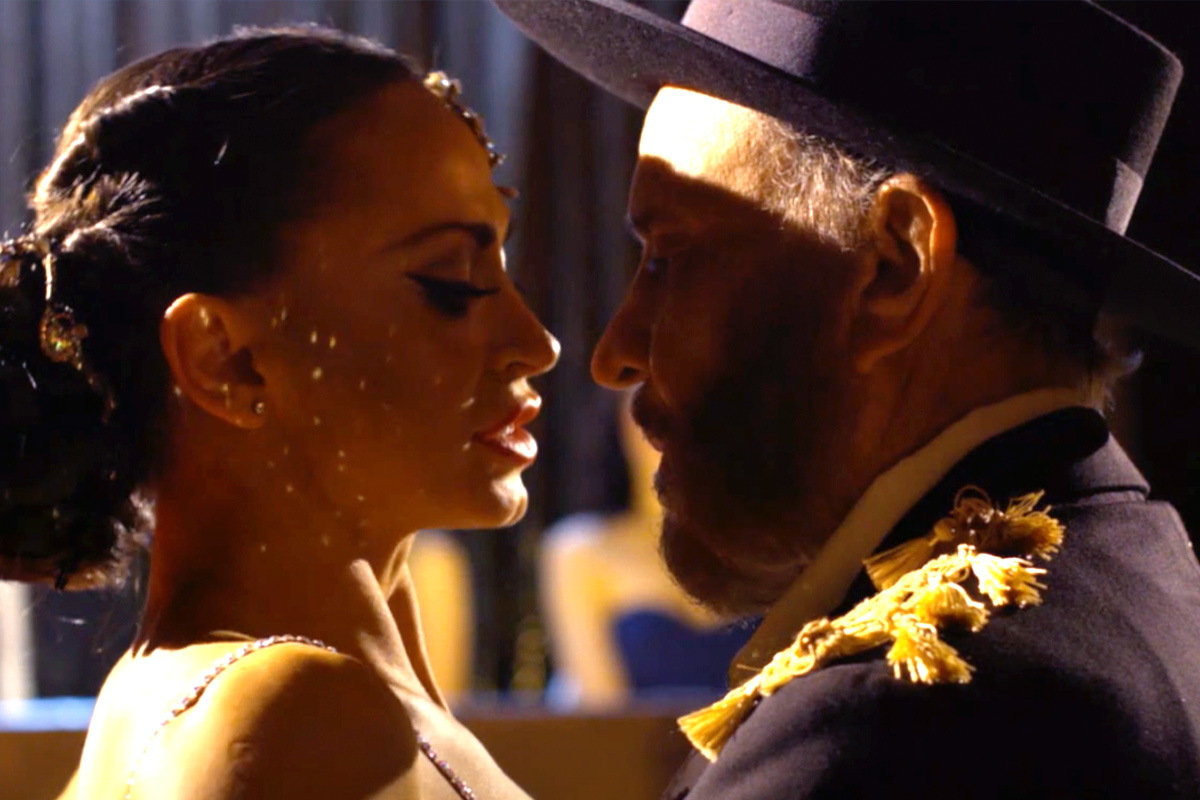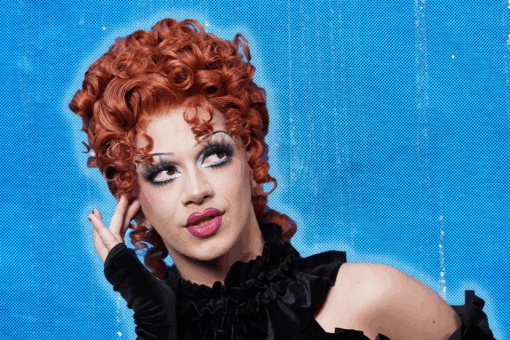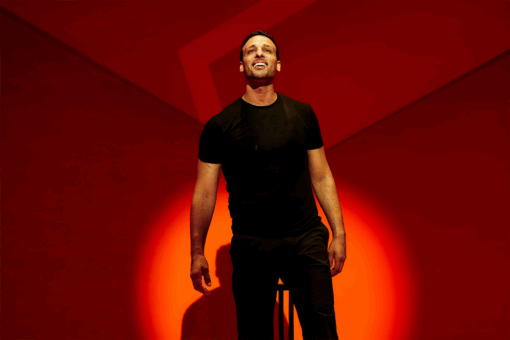“If a dumpster fire and horse shit had an illegitimate child, that child would be better than this movie.” – My friend David
Hello there. It’s me, Shoshana. I consider myself a liker-of-good-films, a connoisseur of “Grey’s Anatomy” seasons 1-6, and a Jew. When the editor of Alma sent me the trailer of “Tango Shalom” to ask my thoughts, I remember thinking, “Ah, it’s a harmless eccentric movie that might show us an interesting take on Hasidic life. It can’t be that bad.” Let me tell you, dear reader: It is that bad.
“Tango Shalom,” a movie now playing in select theaters with the tagline “Following your dreams can be rather unorthodox,” is about a Hasidic man named Moshe who thinks that winning a tango competition will win him the money he needs to fund his school. The only problem is that to dance the tango, you need to touch a woman, something that halacha-abiding men notably don’t do unless that woman is their wife. This sets Moshe off on a quest to find loopholes and a religious belief system that will let him compete.
It’s a confusing, oftentimes upsetting film. At several points throughout, my friend yelled “what the fuck” at the screen, while I threw my hands up in despair. I can’t tell if the writer or director has ever met a Hasidic Jew, let alone spent time around one, and I wonder if the handful of reviewers on Rotten Tomatoes who have given this film a 75% rating have ever seen a movie in their life.
I can say a lot of things about its faults as a film before I even get to the whole “how can you possibly think this is good representation” thing. The dialogue is stilted, the acting is abysmal and entire plot points make little to no sense. For example, in the weeks since I watched the film, I cannot stop thinking about the prize tier system of the tango competition. They say it’s the first annual Argentine Tango competition, which means it’s a competition that has never been held before. Despite that, it’s a televised event and the total prize money is $500K? You’re telling me I could come in third place in this debut competition and win FIFTY THOUSAND DOLLARS????? And first place is TWO HUNDRED AND FIFTY THOUSAND DOLLARS???? I love a good “this prize money is the exact amount we need to save our school/dance studio/insert other beloved thing here” but oh my God, at least make it a bit realistic. Who is the rich fan of Argentinian tango bankrolling this event?????
More seriously, there are several moments in the film where I had to pause and say, “Is this…. racist?” It was, in fact, racist. I understand the desire to visually portray a Hasidic man venturing out beyond his insular community and into the big cityscape that is the non-Crown Heights part of New York City (even though it is totally unbelievable that a middle aged Hasidic man has never encountered non-Jewish people before). But perhaps one shouldn’t portray this venturing-out by having a random circle of Black people playing hip-hop aggressively, dancing in the street and antagonizing the protagonist. The Muslim Imam also makes claims about Islam that just are not true. And when introducing a Hindu mystic, maybe we should make sure we don’t dress him in a Sikh headdress, nor film him in what is clearly a Sikh community? Also, why did he have to be so creepy and ~spooky~? The general air of eerie exoticism for laughs when it comes to this character made me uneasy, and it felt unnecessary, like it was playing for a cheap (racist) laugh. Maybe — just maybe — if we make films that are, in some ways, about interfaith relationship building, said films shouldn’t leave the viewer feeling like they just witnessed a hate crime.
Again, these are all faults before we even talk about the way Hasidic Jews have been portrayed in this film. The religious Jews in this movie are all over the place. We know the characters are Chabad-Lubavitch due to the sheer number of Rebbe photos and problematic Messianic flags that decorate the sets. But the Chabad kids have long curly peyot (Jewish sideburns) even though Chabad Hasidim generally don’t grow out their peyot. They’re also Hasidim in the middle of New York who don’t say the Yiddish greeting, “Gut Shabbos,” but instead say the Hebrew, “Shabbat shalom.” I know what you’re thinking: Shoshana! You’re being too nitpicky, nobody cares about that stuff! But the truth is literally everything I’ve mentioned in this paragraph happened in the first two scenes. It gets a whole lot worse.
Why do 50% of the Hasidic people in this movie have random Yiddish accents that make them sound like they just checked into Ellis Island? Hasidic accents exist but these are NOT it. Renee Taylor only commits to hers for like one scene, and Lainie Kazan is literally doing the same accent she does in “My Big Fat Greek Wedding.” And of course we had to play Jewish Word Bingo — we get a nice handful of meshugenas, tuchuses, gentiles and shiksas, but none of the characters were able to say daven instead of pray? Or infuse any other Jewish-isms into their vocabulary? Why is a woman’s hair hanging out of the back of her sheitel (wig) in several scenes? Why does a Hasidic man literally jump away from a woman’s outstretched hand as though she has the plague? Why is he so concerned about dancing with a woman, but happily walks into a church, something that he is unequivocally not allowed to do? And why can he even be alone in a room with her, when by Jewish law, yichud disallows men and women being alone one-on-one in a room together? Why does a rabbi pull a random volume of Talmud off the shelf and start reading it in search of an answer? Why does the rabbi then quote “Fiddler on the Roof” instead of a passage from said Talmud? Why do they call their rabbi Grand Rebbe instead of just Rebbe or Rav or Admor? Why does he decide dancing with a balloon between him and his partner — so they don’t touch — is allowed, even though the dance is one of the most oddly sensual things I’ve ever seen and is definitely just as bad as if they had been touching in the first place? Why does his teenage son call the internet “cyber-space” like he was born in 1952? Why does his teenage son also seem to fundamentally not understand how either Twitter or Jewish gossip works and yet the entire plot hinges on local Jewish gossip being disseminated on Twitter (you guys! Whatsapp is a thing!!)?
In her recent Time article, Sarah Seltzer raises the idea of Jewish literacy in film and television. That is, if an actor is Jewishly literate, we tend to not mind if they’re actually Jewish or not. What Seltzer doesn’t necessarily address is that due to the diversity of Jewish culture, tradition and community, there are several different types of Jewish literacy one can have. And that is the issue with “Tango Shalom”: It may be made by Jews, it may star Jews, but it seems that nobody involved in this production is literate in the world of Hasidic Jews. Instead of a lighthearted film about a man’s journey through religious turmoil, we get a hot mess filled with farcical caricatures and an abysmal portrayal of a community the filmmakers aren’t invested in, nor knowledgeable about.
There are only three things I can give this movie praise for. Firstly, the portrayal of intimacy between a married Hasidic couple is something we don’t often get to see onscreen and despite my hatred for the rest of the film, it was very refreshing to watch a married religious couple laugh together, touch each other and lay in bed together. Secondly, there is a point in the movie where the daughter says the phrase, “David Cohen, he’s Sarah Levy’s cousin from Monsey.” That right there. Those words. That is an accurate representation of this community. That is what it’s like. You don’t need anything else; build a movie that is just a teenage girl name-dropping people from the Tri-state area that she knows. And lastly, at one point in the film my friend thought that Billy Joel had a surprise cameo and I have never laughed so hard in my entire life. (As an aside, this friend is also convinced that they snuck a pocket camera into 770, the Chabad headquarters in Brooklyn, to film, and honestly, I think I believe him.)
So yeah. That’s the movie. I got to see it for free, and I still want my money back. I think a new law should be written stating if you want to make a movie about Hasidic Jews, you have to talk to one Hasidic Jew about it first. Or just DM me and pay me to read your script and tell you why it’s incorrect.
OH MY GOD I ALMOST FORGOT: As I mentioned, the movie relies heavily on the idea that if you dance with a balloon in between you, it’s pretty much kosher (it’s not). This, my friends, is a plot line on “Glee.” Not even a plot line, it’s a single scene in season one and this movie literally uses it as a main storytelling device, oh my God. OK anyway bye.



